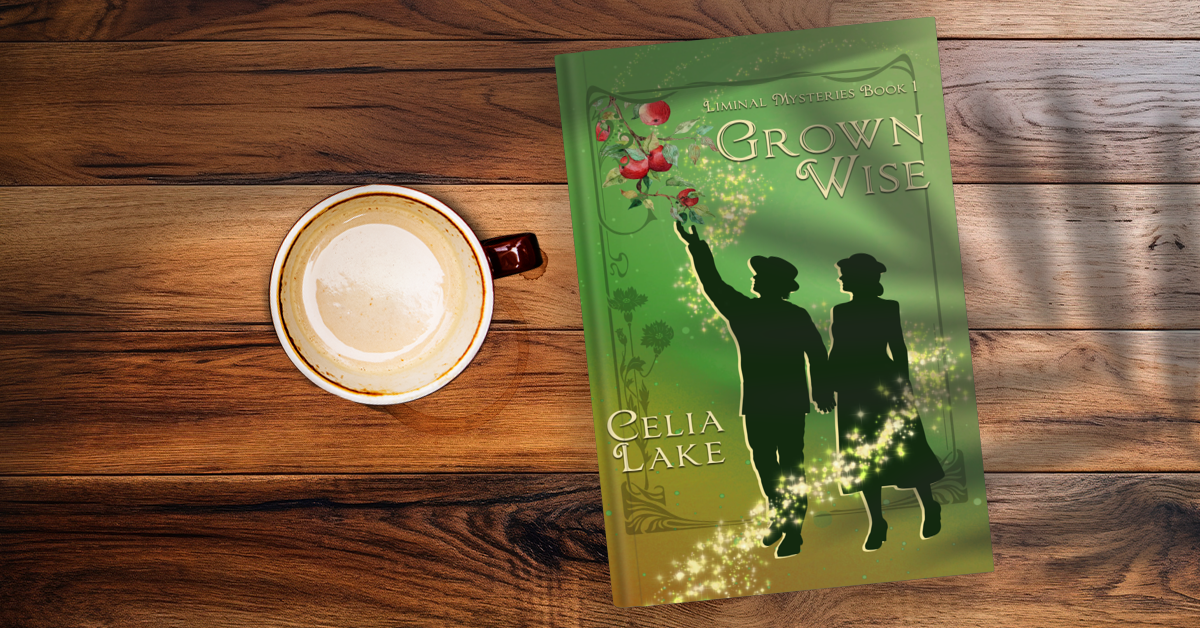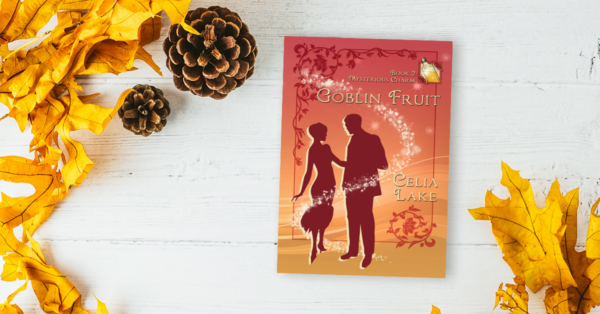Time to explore the ideas behind Grown Wise! There are quite a few (well, the whole Mysterious Fields trilogy, plus aspects of Eclipse and The Magic of Four….)

The Mysterious Fields trilogy
The Mysterious Fields trilogy is a big part of why Grown Wise exists. Or rather, I was thinking about Grown Wise when I started writing the trilogy. You can think of Grown Wise as the other bookend, along a whole stretch of complex family history. (More about the ideas behind the trilogy over here.)
Perspectives and Grown Wise
In the trilogy, we see three generations Fortier family (Chrodechildis, her sons Clovis and Dagobert, and their children). But we see them, through the trilogy, from the outside. None of them are point of view characters. [1] Ursula, of course, is one more generation further down the tree. She’s the daughter of Dagobert and Laudine’s younger son, Isembard.
Thessaly and Vitus, the main characters of the trilogy, discover a lot over the course of three books. But they don’t have access to all the information. Some details are hedged around by oaths. Some are things no one in the family talks about. And the Fortiers are a family hedged round by thorns and worries.
Garin
Garin Fortier – Ursula’s uncle – is a particularly interesting member of the family. I did not expect him to have this kind of arc when I started writing him as a skilled and competent but deeply difficult person to be around. Over time – and quite a few books – there’s a lot about him that’s far more complex than that first glance suggests.
The trilogy gives perspective for Garin. He was a serious (and fairly mature) sort of person at 9. But the events and aftermath of the trilogy and what it means for his parents and for him obviously are a major pivot point in his life. Only it’s a pivot that no one talks about directly. (For all sorts of reasons, many of them actually quite reasonable.)
Garin grows up knowing the expectations on him, and throwing himself into fulfilling those expectations. We’ll come back to this in a couple of weeks with a fuller look at his arc as a blog post. They include two Challenges for the Council (and decades of dedicated service there) and a marriage. And in his later years, turning away from the Council to do something different (and much needed).
Arundel
One of the things I loved showing in Grown Wise was the care that Garin takes with Arundel. He does not have an intuitive sense for the land and land magic, the same way some of my other characters do. (Geoffrey Carillon, Gabe Edgarton, and to a fair extent, Garin’s brother and nephew, Isembard and Leo.) But he is diligent about tending the land, about listening to people with expertise about what is needed, and what is supporting that.
(In the very first chapter of Grown Wise, he and Ursula have independently come to the same decision about what would be helpful. Helpful both politically and in pragmatic financial terms, for their tenants and for their land.)
The care that Garin takes with the estate is visible in dozens of small ways. Oh, some of it’s certainly tuned to his own preferences. There are those three poison gardens, a common anchor of both alchemical work and protective work. But he hires capable people, treats them well, and makes sure the resources to do what’s needed are available. Even when that’s outside his own skills.
Rebuilding after the war
Grown Wise is the first of a four book series exploring what life and love look like after the Second World War. I’ve said previously I don’t intend to write past 1950 for a number of reasons [2]. But I’m loving getting a chance to explore the late 1940s and what that means.
Some of this is directly in the book. We have what it was like to go to war and come back, in Jim’s experience. And also, with Jim, what it was like not to be part of the big talked about military events, but to be trailing slightly behind. (And yet, that has its costs and damages and sorrows.) We have ongoing legal and societal changes. These include ongoing rationing, but also things like the Agriculture Act that are designed to rewrite a fair bit of the underlying landscape in particular ways.
There are other more subtle changes. Part of the plot of Grown Wise takes on the question of how much support people at home had to share, and what it looks like when the community doesn’t get that. (Even for some excellent reasons, like everyone working flat out to do more immediately essential tasks.)
And finally, in Albion’s case, there are a number of changes to the Council. People who’d held their seats through the war are beginning to consider retirement. That changes the nature of the group, it means a new Council Head, and all sorts of implications following from that.
A terrifying delight
I keep describing Ursula as a terrifying delight for a reason. One of the things that fascinates me about writing generationally (as I’ve done or am doing for the Fortiers, Carillons, and Edgartons at this point) is the way different personalities emerge from the same parents and approximately the same years of birth.
Ursula and Leo – her younger brother – are absolutely both the children of their parents in particular and visible ways. But they’re not the same. Ursula combines all her mother’s ability to see patterns, especially some of the more obscure ones. (Thesan points out at one point that astronomy is at least partly the art of figuring out what’s there by what you can’t see).
And she has her father’s charm and social skills, as well as understanding how to frame a situation as a duel. (Even though Ursula is not actually a particularly competent duellist. At least by her standards.) [3]
What that means
I’ve loved getting to explore the ways Ursula and Leo are different – and also the ways Ursula is attentive to her younger brother’s needs and preferences. She wanted – and pushed – to become her uncle’s Heir for all sorts of reasons. But one particular one was that if she does, no one will pressure Leo to do that.
The other delight here is seeing Ursula’s relationships with all her many uncles. (And the extras will have a bit more of a couple of those!) I particularly loved watching her move from a child-adult interaction with them into them very much considering her also an adult, with approaches worth listening to. Ursula has worked hard for that – as is visible from her narration, she thinks about it a lot.
I particularly love the way she is with Alexander, teasing him and pressing him just the right amount. From the other side, I love how he is with her – thinking about questions of protection and skill, but also laying out reading for mutual delight. Or at least excellent debate.
And a few secrets
I’m not going to go into them here – I don’t want to spoil the book for anyone who hasn’t read it!
But I am delighted we got to look a bit more at one of Albion’s secret societies in a lot more detail. On this front, the next 1920s series I have planned will likely be called Mysterious Societies. We’ll spend more time with each of the societies in turn, along with a romance (and I also plan to spend more time in Trellech’s library, through the series.)
Footnotes
[1] I am working on editing up the trilogy extras, and you do get to see some of the Fortier characters as point of view characters in there. Also Alexander. And yes, a bit more direct information about some key scenes.
[2] Since we’re already having footnotes! First, if I write too far into the 1950s, I have to face the fact that a number of characters – Gil and Magni in particular – are getting up there in age and are likely to die. And second, in the 1950s, I start being less interested in the landscape of the larger world outside of Albion, or how it interacts with Albion. (It’s also a different kind of research challenge, for reasons I’ve gone into partly in the public Patreon post about Apt To Be Suspicious, the next book in this post-war series.) https://www.patreon.com/posts/researching-apt-127165646
[3] Obviously, she’s basing her standards on her father, her uncle Alexander, and several of the other best duellists of their respective generations. Never mind her little brother, Leo, who’s shaping up to be quite good at it. Or Artemis and Theo Lefton, who are just plain terrifying together.

